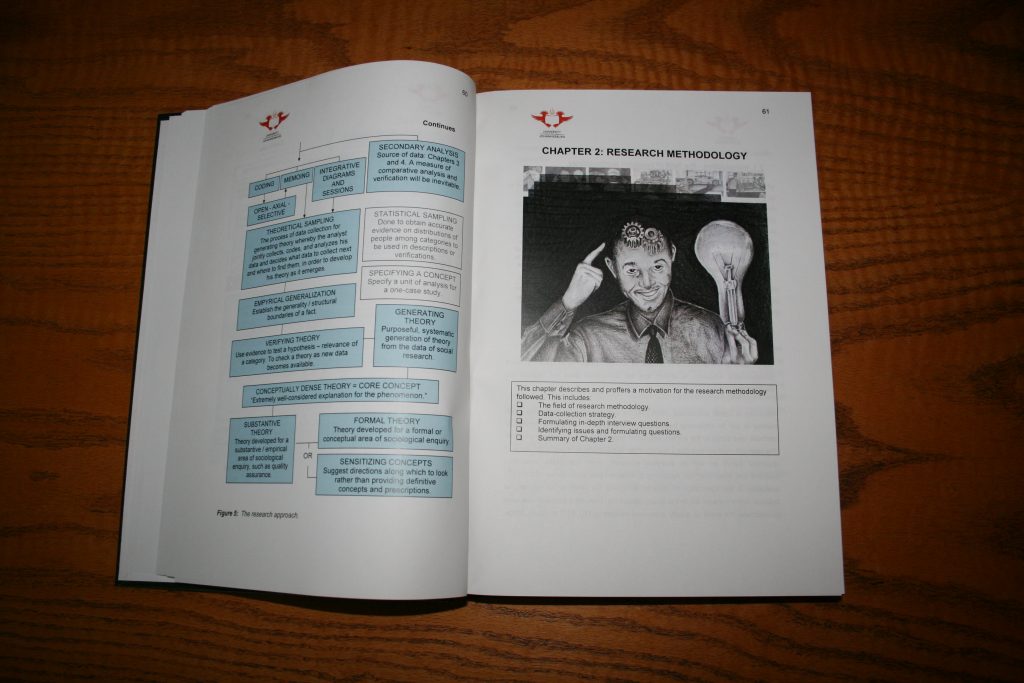
Introduction
I will discuss chapters 2, 3 and 4 as one unit because they belong together.
The literature review can be more than one chapter, depending on the topic of your research and the amount of theory that is needed.
You can, for example, have a chapter on the literature study that you did in preparation for the oral presentation of your research proposal and a second chapter on the literature study that you did when you did additional literature study after your proposal was accepted and you embarked on the real research.
You could also have explained your research approach for your study proposal in your first chapter already.
You can also explain the research methods that you used for the initial literature study as part of Chapter 2 and have a separate chapter dealing with the literature study and practical data collection processes as a Chapter 3.
Let me show the option that I discuss here in a table:
| Option 1 | Option 2 | Option 3 |
| Chapter 1: Contextualising the study.Research done for the oral presentation of your study proposal. | Chapter 1: Contextualising the study. | Chapter 1: Contextualising the study. |
| Chapter 2: You research approach for the literature study as well as the fieldwork that you will do now that your research proposal has been approved. | Chapter 2: Literature study prior to your oral presentation. | Chapter 2: Your research approach for both the literature study prior to and after your research proposal. |
| Chapter 4: Fieldwork. | Chapter 3: You research approach for the literature study as well as the fieldwork that you will do now that your research proposal has been approved. | Chapter 3: You research approach for the fieldwork that you will do. |
In essence, you will need to describe your research approach for the literature study prior to presenting your research proposal, the theoretical content that you will research after your research proposal has been approved and the fieldwork that you will do.
You should identify as much as possible theoretical information on similar research that was previously done, knowledge captured in books and other sources of information and related knowledge that might be of value for your research.
Reasons why you will need to study literature:
- To prepare for an oral presentation of your research proposal.
- To familiarise you with the knowledge and to determine if it relates to your research.
- To dispel myths about the field of study.
- To explain competing conceptual frameworks.
- To clarify the focus of your research.
- To justify your assumptions.
You should satisfy the following questions in your literature review:
- Are there sources relevant to the topic of your research?
- If there are sources, what do they say about the nature and the development of the topic? (Ontology and epistemology.)
- How are the issues researched in the existing literature?
- How detail and complete are the literature on the topic?
(Are the points made in the literature elicited and synthesized, or just paraphrased?)
- How does the literature interpret the concepts and issues on the topic?
- Does the review clearly indicate when sources are being quoted? (Is it the work of the writers or did they borrow it from somebody else?)
- Are sources adequately referenced?
- Do you agree with the existing literature on the topic?
You will need to summarise the existing theory about the topic as a last section of the chapter or chapters.
If your study is just a literature study – you will move on to conclusions and recommendations at the end of this chapter.
That would mean that you will not need to do any fieldwork or experiments.
Summary
It is essential to do as much literature study as you possibly can for two main reasons:
- To prepare for your oral study proposal.
- To serve as the foundation of the research that you will embark on.
Preparing this chapter or chapters might require many hours of hard work.
This will enable you to plan your research properly.
